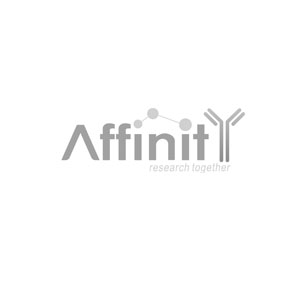PTPRK Antibody - #DF9842
| Product: | PTPRK Antibody |
| Catalog: | DF9842 |
| Description: | Rabbit polyclonal antibody to PTPRK |
| Application: | WB IHC |
| Reactivity: | Human, Mouse |
| Prediction: | Pig, Zebrafish, Bovine, Horse, Sheep, Chicken |
| Mol.Wt.: | 162 kDa; 162kD(Calculated). |
| Uniprot: | Q15262 |
| RRID: | AB_2843036 |
Related Downloads
Protocols
Product Info
*The optimal dilutions should be determined by the end user.
*Tips:
WB: For western blot detection of denatured protein samples. IHC: For immunohistochemical detection of paraffin sections (IHC-p) or frozen sections (IHC-f) of tissue samples. IF/ICC: For immunofluorescence detection of cell samples. ELISA(peptide): For ELISA detection of antigenic peptide.
Cite Format: Affinity Biosciences Cat# DF9842, RRID:AB_2843036.
Fold/Unfold
dJ480J14.2.1; DKFZp686C2268; DKFZp779N1045; OTTHUMP00000017180; OTTHUMP00000017181; OTTHUMP00000017182; OTTHUMP00000017187; OTTHUMP00000040306; Protein tyrosine phosphatase kappa; Protein tyrosine phosphatase kappa precursor; Protein tyrosine phosphatase receptor type K; Protein tyrosine phosphatase receptor type kappa; Protein-tyrosine phosphatase kappa; PTPK; PTPkappa; Ptprk; PTPRK_HUMAN; R PTP kappa; R-PTP-kappa; Receptor type tyrosine protein phosphatase kappa; Receptor-type tyrosine-protein phosphatase kappa;
Immunogens
High levels in lung, brain and colon; less in liver, pancreas, stomach, kidney, placenta and mammary carcinoma.
- Q15262 PTPRK_HUMAN:
- Protein BLAST With
- NCBI/
- ExPASy/
- Uniprot
MDTTAAAALPAFVALLLLSPWPLLGSAQGQFSAGGCTFDDGPGACDYHQDLYDDFEWVHVSAQEPHYLPPEMPQGSYMIVDSSDHDPGEKARLQLPTMKENDTHCIDFSYLLYSQKGLNPGTLNILVRVNKGPLANPIWNVTGFTGRDWLRAELAVSTFWPNEYQVIFEAEVSGGRSGYIAIDDIQVLSYPCDKSPHFLRLGDVEVNAGQNATFQCIATGRDAVHNKLWLQRRNGEDIPVAQTKNINHRRFAASFRLQEVTKTDQDLYRCVTQSERGSGVSNFAQLIVREPPRPIAPPQLLGVGPTYLLIQLNANSIIGDGPIILKEVEYRMTSGSWTETHAVNAPTYKLWHLDPDTEYEIRVLLTRPGEGGTGLPGPPLITRTKCAEPMRTPKTLKIAEIQARRIAVDWESLGYNITRCHTFNVTICYHYFRGHNESKADCLDMDPKAPQHVVNHLPPYTNVSLKMILTNPEGRKESEETIIQTDEDVPGPVPVKSLQGTSFENKIFLNWKEPLDPNGIITQYEISYSSIRSFDPAVPVAGPPQTVSNLWNSTHHVFMHLHPGTTYQFFIRASTVKGFGPATAINVTTNISAPTLPDYEGVDASLNETATTITVLLRPAQAKGAPISAYQIVVEELHPHRTKREAGAMECYQVPVTYQNAMSGGAPYYFAAELPPGNLPEPAPFTVGDNRTYQGFWNPPLAPRKGYNIYFQAMSSVEKETKTQCVRIATKAATEEPEVIPDPAKQTDRVVKIAGISAGILVFILLLLVVILIVKKSKLAKKRKDAMGNTRQEMTHMVNAMDRSYADQSTLHAEDPLSITFMDQHNFSPRYENHSATAESSRLLDVPRYLCEGTESPYQTGQLHPAIRVADLLQHINLMKTSDSYGFKEEYESFFEGQSASWDVAKKDQNRAKNRYGNIIAYDHSRVILQPVEDDPSSDYINANYIDGYQRPSHYIATQGPVHETVYDFWRMIWQEQSACIVMVTNLVEVGRVKCYKYWPDDTEVYGDFKVTCVEMEPLAEYVVRTFTLERRGYNEIREVKQFHFTGWPDHGVPYHATGLLSFIRRVKLSNPPSAGPIVVHCSAGAGRTGCYIVIDIMLDMAEREGVVDIYNCVKALRSRRINMVQTEEQYIFIHDAILEACLCGETAIPVCEFKAAYFDMIRIDSQTNSSHLKDEFQTLNSVTPRLQAEDCSIACLPRNHDKNRFMDMLPPDRCLPFLITIDGESSNYINAALMDSYRQPAAFIVTQYPLPNTVKDFWRLVYDYGCTSIVMLNEVDLSQGCPQYWPEEGMLRYGPIQVECMSCSMDCDVINRIFRICNLTRPQEGYLMVQQFQYLGWASHREVPGSKRSFLKLILQVEKWQEECEEGEGRTIIHCLNGGGRSGMFCAIGIVVEMVKRQNVVDVFHAVKTLRNSKPNMVEAPEQYRFCYDVALEYLESS
Predictions
Score>80(red) has high confidence and is suggested to be used for WB detection. *The prediction model is mainly based on the alignment of immunogen sequences, the results are for reference only, not as the basis of quality assurance.
High(score>80) Medium(80>score>50) Low(score<50) No confidence
PTMs - Q15262 As Substrate
| Site | PTM Type | Enzyme | Source |
|---|---|---|---|
| K194 | Ubiquitination | Uniprot | |
| K227 | Ubiquitination | Uniprot | |
| K262 | Ubiquitination | Uniprot | |
| T357 | Phosphorylation | Uniprot | |
| K397 | Ubiquitination | Uniprot | |
| N416 | N-Glycosylation | Uniprot | |
| K476 | Ubiquitination | Uniprot | |
| T485 | Phosphorylation | Uniprot | |
| K778 | Acetylation | Uniprot | |
| T790 | Phosphorylation | Uniprot | |
| Y805 | Phosphorylation | Uniprot | |
| S828 | Phosphorylation | Uniprot | |
| Y831 | Phosphorylation | Uniprot | |
| S835 | Phosphorylation | Uniprot | |
| Y849 | Phosphorylation | Uniprot | |
| T854 | Phosphorylation | Uniprot | |
| S856 | Phosphorylation | Uniprot | |
| Y858 | Phosphorylation | Uniprot | |
| T860 | Phosphorylation | Uniprot | |
| Y916 | Phosphorylation | Uniprot | |
| Y922 | Phosphorylation | Uniprot | |
| Y940 | Phosphorylation | Uniprot | |
| Y945 | Phosphorylation | Uniprot | |
| Y1158 | Phosphorylation | Uniprot | |
| K1174 | Ubiquitination | Uniprot | |
| T1184 | Phosphorylation | Uniprot | |
| Y1294 | Phosphorylation | Uniprot | |
| K1360 | Ubiquitination | Uniprot | |
| K1415 | Ubiquitination | Uniprot |
Research Backgrounds
Regulation of processes involving cell contact and adhesion such as growth control, tumor invasion, and metastasis. Negative regulator of EGFR signaling pathway. Forms complexes with beta-catenin and gamma-catenin/plakoglobin. Beta-catenin may be a substrate for the catalytic activity of PTPRK/PTP-kappa.
This protein undergoes proteolytic processing.
Cell junction>Adherens junction. Cell membrane>Single-pass type I membrane protein.
High levels in lung, brain and colon; less in liver, pancreas, stomach, kidney, placenta and mammary carcinoma.
Belongs to the protein-tyrosine phosphatase family. Receptor class 2B subfamily.
Restrictive clause
Affinity Biosciences tests all products strictly. Citations are provided as a resource for additional applications that have not been validated by Affinity Biosciences. Please choose the appropriate format for each application and consult Materials and Methods sections for additional details about the use of any product in these publications.
For Research Use Only.
Not for use in diagnostic or therapeutic procedures. Not for resale. Not for distribution without written consent. Affinity Biosciences will not be held responsible for patent infringement or other violations that may occur with the use of our products. Affinity Biosciences, Affinity Biosciences Logo and all other trademarks are the property of Affinity Biosciences LTD.
